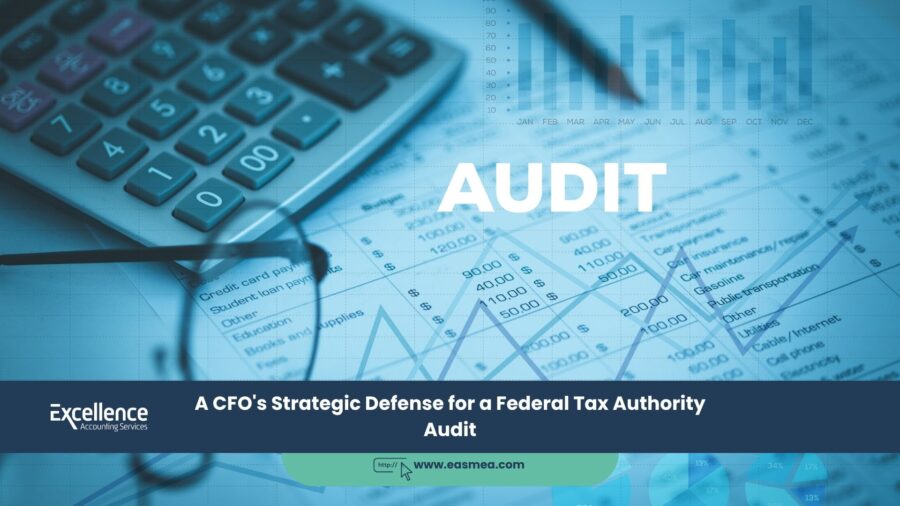The CFO’s Playbook: A Strategic Defense for a Federal Tax Authority Audit in the UAE
For any business operating in the UAE, few communications are as daunting as a notification of a Federal Tax Authority audit. This official review of your company’s tax records is not merely a procedural check; it is a rigorous examination of your financial integrity, compliance framework, and internal controls. An unprepared business can face significant penalties, reputational damage, and disruptive operational strain. However, for a company guided by strategic financial leadership, an audit is not a crisis—it is a test of a system that is already built to be resilient, transparent, and defensible.
- The CFO's Playbook: A Strategic Defense for a Federal Tax Authority Audit in the UAE
- The Pre-Audit Fortress: Building Your Defense Before the Notice Arrives
- The Audit Engagement: Navigating the Process with Strategic Poise
- The Post-Audit Strategy: Resolution and Future-Proofing
- What Excellence Accounting Services (EAS) Can Offer: Your Shield in a Federal Tax Authority Audit
- Frequently Asked Questions (FAQs)
- Is Your Business Ready for a Federal Tax Authority Audit?
This is where the Chief Financial Officer (CFO) or a strategic outsourced CFO service transitions from a financial planner to a strategic defender. The strength of your defense against a Federal Tax Authority audit is not forged in the frantic days after receiving the notice; it is built methodically over months and years through disciplined financial practices. This guide provides a comprehensive playbook for CFOs and business leaders on how to prepare for, manage, and successfully navigate a Federal Tax Authority audit, transforming a potential threat into an affirmation of your company’s financial robustness.
Key Takeaways
- Audit Readiness is a Continuous State: The best defense for a Federal Tax Authority audit is a year-round commitment to immaculate bookkeeping, robust internal controls, and proactive tax planning.
- The CFO is the Strategic Lead: During an audit, the CFO acts as the central point of contact, managing all communications and ensuring a consistent, professional, and strategic response.
- Documentation is Your Shield: The ability to produce clear, organized, and complete documentation to support every figure on your tax returns is the cornerstone of a successful audit defense.
- Proactive, Not Reactive: A strategic CFO uses tools like regular internal audits to identify and rectify potential red flags long before the FTA gets involved.
- Expert Guidance is Non-Negotiable: Successfully navigating a Federal Tax Authority audit requires a team approach, combining the internal knowledge of the CFO with the specialized expertise of external tax advisors.
The Pre-Audit Fortress: Building Your Defense Before the Notice Arrives
The outcome of a Federal Tax Authority audit is overwhelmingly determined by the work done before the audit is even announced. A strategic CFO focuses on building a “fortress” of compliance and documentation that can withstand any scrutiny. This proactive defense is built on several key pillars.
1. Immaculate Bookkeeping and Accounting: The First Line of Defense
Every number in your VAT or Corporate Tax return originates from your books. If the source is flawed, the return will be too. A CFO ensures that the company’s accounting and bookkeeping are not just an administrative task, but a core business function governed by discipline and accuracy. This includes:
- Consistent and Correct Transaction Coding: Ensuring all revenue and expenses are classified correctly according to tax law.
- Regular Reconciliations: Diligent monthly reconciliation of all bank accounts, credit cards, and control accounts, supported by services like account reconciliation.
- A Clear Audit Trail: Every journal entry and transaction must be supported by verifiable documentation (invoices, receipts, contracts).
2. A Robust UAE Finance Tech Stack
Manual processes and disconnected spreadsheets are a breeding ground for errors that attract the attention of auditors. A CFO champions the implementation of a modern accounting system and an integrated tech stack. This provides automation, reduces human error, and creates a single source of truth, making it far easier to pull accurate data during a Federal Tax Authority audit.
3. Proactive Internal Audits and Health Checks
Why wait for the FTA to find your mistakes? A strategic CFO uses regular internal audits or financial health checks as a form of “stress testing.” These reviews simulate an audit environment, identifying potential red flags, documentation gaps, and areas of non-compliance. This allows the company to correct issues proactively, demonstrating a commitment to compliance that is viewed favorably by tax authorities.
4. Strategic Tax Planning and Expert Advisory
Compliance is not just about paying taxes; it’s about paying the *correct* amount of tax. A CFO works with expert corporate tax advisors and VAT consultants to build a robust tax strategy. This involves:
- Clear Tax Positions: For any complex or gray areas of tax law, the company should have a clearly documented position paper explaining its reasoning for treating a transaction in a certain way.
- Transfer Pricing Documentation: For businesses with transactions between related parties, maintaining comprehensive transfer pricing documentation is mandatory and a key focus of any Federal Tax Authority audit.
- Staying Updated: The tax landscape is always evolving. A CFO ensures the company stays ahead of changes in legislation and FTA clarifications.
A Federal Tax Authority audit doesn’t test your ability to scramble for documents; it tests the integrity of the financial systems you operate every single day.
The Audit Engagement: Navigating the Process with Strategic Poise
Despite the best preparation, an audit notice can still arrive. How you manage the process from this point forward is critical. The CFO’s role is to lead a calm, organized, and strategic response.
Step 1: Assemble the Response Team
Upon receiving the audit notice, the CFO immediately assembles the core response team. This typically includes the internal accountant, the company’s external tax advisor or audit support service, and potentially a legal expert if the issues are highly complex. All communication with the FTA should be funneled through this team.
Step 2: Establish the CFO as the Single Point of Contact
To ensure consistency and control, the CFO should be designated as the primary point of contact for the FTA auditor. This prevents employees from inadvertently providing incomplete, speculative, or incorrect information. The CFO manages the flow of information, ensuring that every response is reviewed, accurate, and strategic.
Step 3: Understand the Scope and Prepare Accordingly
The audit notice will specify the tax period and the areas under review. The CFO and the team must carefully analyze this scope and begin gathering all relevant documentation for that period. The goal is to be over-prepared but to provide information in a structured, deliberate manner. This is not the time to volunteer extra information beyond what is requested.
Step 4: Manage the Information Flow
Responding to FTA requests should be done professionally and in a timely manner. The CFO oversees the process of providing clear, legible copies of requested documents. It’s crucial to maintain a log of everything provided to the auditor. If a request is unclear, the CFO should seek clarification from the auditor rather than making assumptions.
The Post-Audit Strategy: Resolution and Future-Proofing
The end of the fieldwork is not the end of the Federal Tax Authority audit. The final stages are about resolution and, most importantly, learning.
Handling the Audit Findings
The FTA will issue a draft of their findings. The CFO and the tax advisor must review this document meticulously. If there are disagreements, this is the opportunity to present counter-arguments supported by documentation and legal interpretation. The goal is to resolve as many issues as possible at this stage before the final assessment is issued.
Resolution and Rectification
If the final audit results in additional taxes or penalties, the CFO manages the process of payment and ensures the company’s books are adjusted correctly. If there are grounds for a formal dispute, the CFO will lead the process of filing a reconsideration with the guidance of tax specialists.
The Post-Mortem: A Critical Learning Opportunity
Once the audit is formally closed, a strategic CFO conducts a thorough internal review. What were the root causes of the adjustments? Were they due to documentation gaps, process failures, or misinterpretation of the law? The findings from this post-mortem are used to implement corrective actions—such as improving a process, investing in staff training, or updating the tech stack—to “future-proof” the company and strengthen its defenses for the future.
What Excellence Accounting Services (EAS) Can Offer: Your Shield in a Federal Tax Authority Audit
Facing a Federal Tax Authority audit can be one of the most stressful experiences for a business. At Excellence Accounting Services, we provide the expert support and strategic guidance to turn this challenge into a manageable process.
- Audit Readiness and Health Checks: We conduct pre-emptive reviews of your financial records to identify and rectify potential red flags before an audit is ever announced.
- Expert Tax Advisory: Our dedicated teams for UAE Corporate Tax and VAT Consultancy ensure your tax strategy is compliant and defensible.
- Audit Management and Support: If you receive an audit notice, we act as your expert partner, helping you manage communications with the FTA, prepare documentation, and formulate strategic responses to auditor queries.
- Strategic CFO Guidance: Our Outsourced CFO Services provide the high-level leadership to build a robust compliance framework that minimizes audit risk from the outset.
- Dispute Resolution: Should you disagree with audit findings, we provide the expert support needed to file reconsiderations and represent your case effectively.
Frequently Asked Questions (FAQs)
Audits can be triggered by several factors, including: random selection, inconsistencies in your filings (e.g., large fluctuations in revenue or input VAT claims), filing late or amended returns, large refund requests, discrepancies between your VAT and Corporate Tax returns, or being part of an industry that the FTA is currently focusing on.
The duration varies significantly based on the size and complexity of your business, the quality of your records, and the scope of the audit. A simple audit might be resolved in a few weeks, while a complex audit for a large corporation could take several months or even longer.
Common red flags include: unusually high input VAT claims compared to sales, inconsistent revenue reporting, poor or missing tax invoice documentation, incorrect application of the zero rate or exemptions, significant unsubstantiated expenses, and complex related-party transactions without proper transfer pricing documentation.
You have the right to be treated professionally, to be informed of the audit’s scope, to have representation (like a tax advisor), and to receive a clear explanation of any proposed adjustments. You also have the right to privacy and confidentiality and the right to dispute the audit findings through formal channels.
While technically possible, it is highly inadvisable. Tax law is complex, and auditors are highly trained. Attempting to manage an audit without expert help can lead to miscommunication, providing unnecessary information, and failing to defend your position effectively, which can result in higher penalties. Professional representation is a crucial investment.
Penalties can be severe. They can include fixed penalties for procedural errors (e.g., incorrect records) and percentage-based penalties on the amount of unpaid tax. Penalties can be as high as 50% of the unpaid tax, plus additional late payment penalties. This makes proactive compliance essential.
A tax audit is the *process* of examining your records to verify the accuracy of your tax returns. A tax assessment is the *outcome* or official notice issued by the FTA stating the amount of tax they believe is payable. An assessment can be issued following an audit, or if you fail to file a return.
A VAT audit focuses on transaction-level data: ensuring every sale and purchase has a valid tax invoice and that VAT was calculated and reported correctly. A Corporate Tax audit has a broader scope, examining your overall Profit & Loss statement, the deductibility of expenses, transfer pricing, and the calculation of your total taxable income.
If you disagree with the final assessment, you have the right to file a “reconsideration” request with the FTA within the specified timeframe. You must provide a detailed case with supporting evidence and legal arguments. If the reconsideration is unsuccessful, there is a further dispute resolution process involving the Tax Disputes Resolution Committee.
While no one is truly “audit-proof,” a fractional CFO makes you “audit-ready.” They achieve this by embedding a culture of compliance: implementing robust bookkeeping processes, championing a modern tech stack, conducting regular internal reviews to fix issues proactively, and ensuring a clear and defensible tax strategy is in place. This dramatically reduces the risk of a negative audit outcome.
Conclusion: Turning a Test into a Testimony
A Federal Tax Authority audit is an inevitable part of the business landscape in the UAE. It should not be feared, but it must be respected. With a strategic CFO at the helm, an audit ceases to be a disruptive threat and instead becomes a testimony to your company’s financial discipline, integrity, and commitment to compliance. By building a fortress of proactive controls and managing the audit process with strategic poise, you can protect your business and emerge stronger, more resilient, and with greater confidence in your financial foundations.
Is Your Business Ready for a Federal Tax Authority Audit?
Let Excellence Accounting Services provide the strategic guidance and expert support to ensure your business is prepared for any level of scrutiny. Our audit readiness and tax advisory services are your best defense.




